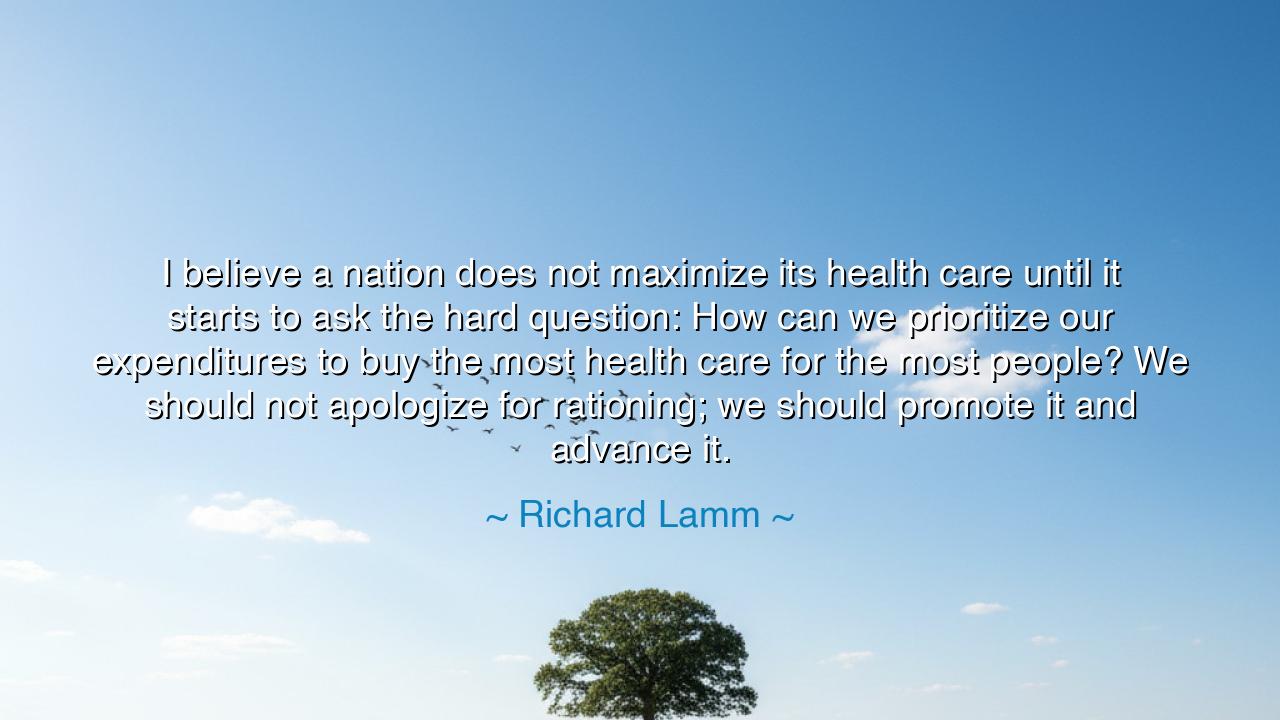
I believe a nation does not maximize its health care until it
I believe a nation does not maximize its health care until it starts to ask the hard question: How can we prioritize our expenditures to buy the most health care for the most people? We should not apologize for rationing; we should promote it and advance it.






The statesman Richard Lamm, known for his fearless thought and his devotion to the welfare of his people, once declared: “I believe a nation does not maximize its health care until it starts to ask the hard question: How can we prioritize our expenditures to buy the most health care for the most people? We should not apologize for rationing; we should promote it and advance it.” These words, though clothed in the garments of modern policy, carry the timeless wisdom of balance and stewardship. They speak of a truth as old as civilization itself—that no society, however rich or powerful, can flourish without wisdom in how it cares for its people, and without courage in how it shares its blessings.
In the ancient world, the philosophers often warned that the measure of a civilization was not in its wealth or its armies, but in the justice of its governance. To govern well is to prioritize, to discern what is most essential for the common good. Lamm’s teaching is rooted in that same principle. He does not call for neglect or austerity, but for wisdom—the ability to see that resources are finite and that compassion must be guided by reason. The hard question, he says, is not whether we should give, but how we can give in a way that sustains life for the many rather than exhausts it on the few. To ration with justice, in his view, is not an act of cruelty, but of moral responsibility.
The origin of this insight comes from Lamm’s long career as a public servant and thinker, one who watched as nations struggled with the rising demands of medicine and the limits of wealth. He saw that no government, however noble in intention, could fulfill every desire or save every life at any cost. Yet to refuse to face this truth, he argued, is to betray both the sick and the healthy—to spend blindly is to condemn future generations to scarcity. Thus, Lamm’s quote is not a cold command, but a call to courage: the courage to speak honestly about the burdens of choice, and to seek balance where others seek comfort.
History itself has shown the wisdom of this view. In the aftermath of the Second World War, the people of Britain built the National Health Service, a system born of compassion and necessity. Yet even in its founding, the architects of the NHS knew that health care must be guided by prioritization. They chose to focus first on universal access to essential care—vaccinations, primary medicine, maternal health—because they understood that to serve all fairly, they could not serve all equally. Their courage to ration wisely allowed millions to live longer, healthier lives, proving that restraint, when guided by justice, becomes the instrument of mercy.
Lamm’s message also holds a deeper, moral dimension. In every era, humanity must confront the illusion of infinite abundance. To refuse rationing is to pretend that choices can be avoided, that resources can be stretched beyond their limits. But wisdom teaches otherwise: in medicine, as in life, we must learn to choose—not as misers, but as caretakers. To prioritize is to ask, “Where can our efforts do the most good?” and to have the strength to act upon the answer, however painful it may be. For the true leader does not promise all things to all people; he ensures that what can be given is given justly and with purpose.
Consider the ancient parable of Solon, the Athenian lawgiver, who when asked how to preserve his city’s prosperity, replied: “By giving to each according to need, not desire.” His wisdom preserved Athens through famine and war, because he understood that justice is not indulgence—it is fairness guided by foresight. So too does Lamm’s teaching reflect this truth. A nation that dares to set priorities, that faces the moral task of rationing with honesty and equity, acts not in cold calculation, but in noble stewardship. Such a nation does not weaken—it strengthens, for it builds its future upon truth, not illusion.
The lesson, then, is one of moral courage. Do not fear the word rationing; fear instead the waste that comes from ignorance and avoidance. A wise people must have the courage to ask: “What truly serves life?” and then direct their resources toward that end. This principle applies not only to governments but to individuals. In your own life, learn to prioritize—to spend your time, energy, and compassion where they can do the most good. For every soul, like every nation, must learn that balance is the secret of longevity, and discipline the guardian of freedom.
So remember, O listener, the teaching of Richard Lamm: that health—whether of the body, the mind, or the nation—is not born of excess, but of wise restraint. To care for many, we must think clearly; to serve the future, we must choose wisely. Let us, then, not apologize for rationing, but embrace it as the highest form of compassion—the courage to govern not by impulse, but by wisdom, and to seek always the greatest good for the greatest number. For in such balance lies the health not only of nations, but of humanity itself.






AAdministratorAdministrator
Welcome, honored guests. Please leave a comment, we will respond soon